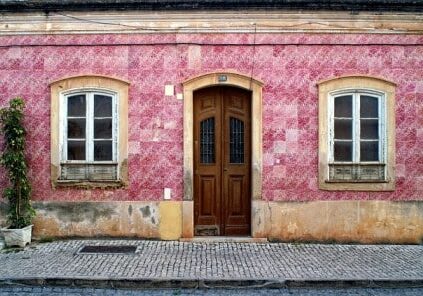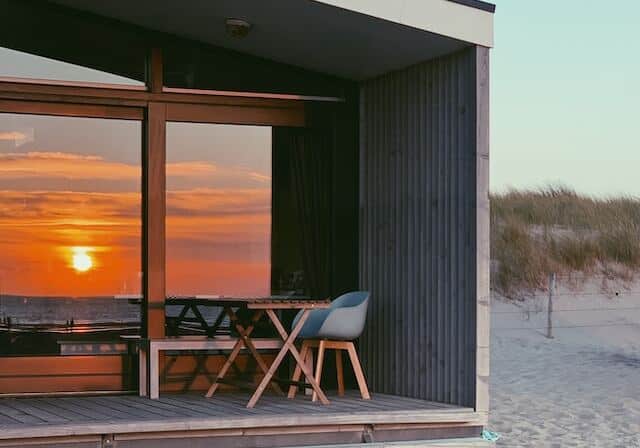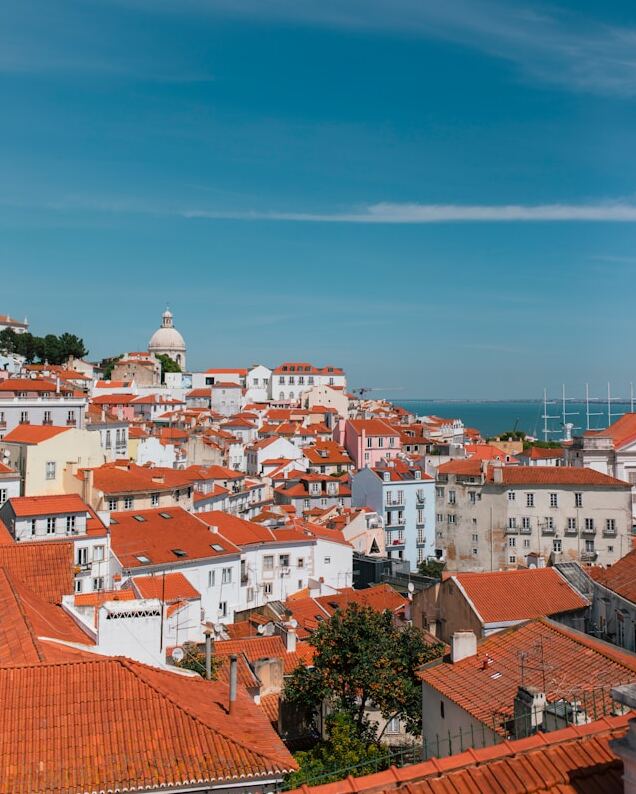Updated: December 17, 2024

In Portugal, you may be surprised by the affordability of land, particularly outside popular locations, and construction costs are also very reasonable compared with equivalent prices in other Western European countries.
In this guide to construction in Portugal, we provide you with an easy step-by-step guide to building your own property in Portugal, delve into the benefits of venturing down this route, and address the main challenges that you’ll face.
We will overview residential construction costs, in addition to offering some insights and tips into navigating Portugal’s construction industry when it comes to building your home from the ground up.
Introduction to Construction in Portugal
The Portuguese construction market was valued at USD $11.6 billion in 2022 and is projected to grow by 2.5 percent from 2023 to 2032, driven by increasing urbanization, population growth, and foreign investment which boost demand for residential, commercial, and infrastructure projects.
The market will achieve an annual average appreciation (AAGR) of over 1 percent from 2025 to 2028, with government incentives in energy and transport construction and infrastructure projects significant contributors to this. This is alongside private investments in commercial and housing projects that will also bolster the country’s construction market.
Constructing property in Portugal
Buying property in Portugal provides an array of options, but building your own charming abode from scratch is a whole different ball game.
If you take a look at the buildings and homes in Portugal, you’ll find a wide range of delightful, eye-catching architecture from iconic buildings with intricate tile designs common in Lisbon and Porto to the charming, white-washed houses with blue façades that are on show in Tavira, in the Algarve, or Ericeira on the Silver Coast.
Infrastructure construction projects in Portugal tend to focus on blending tradition with modern innovation, providing a diverse range of architectural styles that can be seen up and down the country. Whether for industrial construction, infrastructure construction management, commercial construction, or residential construction, the construction industry is fully embracing sustainable construction techniques and modern approaches to speed up the process at the same time as causing minimal adverse environmental effects.
What makes Portugal truly special is that each city or town will have its own unique vibe and architecture while being quintessentially Portuguese in essence.
What is the cost of building a house in Portugal?
One of the advantages of building your own home in Portugal is that it is usually much more affordable than buying a new build.
Construction costs will typically cost between €2,000 to €2,500 per square meter. The price of land is usually much lower, with prices in the interior parts of the Algarve going for as little as €100 – €300 per square meter, highlighting that this is a more affordable route than opting for a new buy. Land for sale in the center, north, or Alentejo region of Portugal can also go for much less than this as well.
Planning Your Construction Project in Portugal
When planning your construction project in Portugal, make sure you take into account the following aspects before you get started.
Consider your timeline
You will also need to factor in your timeline. If you are looking to relocate to Portugal soon, then building a house from scratch is probably not the best option. It can take two to three years to build a house in Portugal, and sometimes even longer, so bear this in mind.
Choose the perfect location
The first decision you will need to make is choosing the right location. Land outside hotspot areas will be cheaper, but you will need to consider proximity to amenities and public transportation links. If you are considering moving with family in a few years, where are the nearest schools? Where is the closest healthcare facility? Are there good restaurants close by? Where is the nearest supermarket? Do you want to be perfectly positioned close to a beach, have lovely coastal views from your upstairs balcony, or be close to a natural part to enjoy your weekends out in nature? You’ll want to factor into your planning before choosing a location.
Understand local regulations
Alongside this, when it comes to infrastructure construction and securing land, you will need to understand local regulations and any land zoning restrictions, for example, if the land falls on protected environmental areas. It’s essential to determine whether you can build on the land before you begin the process of purchasing the land. You should check with your local municipality to ensure there are no restrictions on infrastructure construction or construction activities on the land you intend to buy and that you adhere to building codes and zoning regulations.
How to get a building permit in Portugal?
To build in Portugal, you will need to obtain a building permit and, to do so, you must draw up a contract for your project. You should make sure that you have an experienced lawyer on your side who can help you out with this, ensuring that everything that you need is included in the contract.
This contract will then be signed by a certified construction company of your choosing. They will need to be registered with the National Building and Real Estate Institute, INCI (Instituto da Construção e do Imobiliário), and construction will need to be supervised by an architect or engineer. We also recommend having a project manager by your side to oversee the process and ensure all operations are running smoothly.
Preliminary Considerations Before You Begin Construction

Firstly, you’ll want to move forward with the purchasing of the land for sale in Portugal, ensuring that you are able to build on it. It is worth working with a real estate professional who can assist with negotiations and a lawyer to navigate any legal regulations and help with the land purchase process. Also, hiring a surveyor at this stage is a good idea to ensure everything is in order, for example, whether you need to deal with easements or encroachments by neighboring owners.
The biggest unknown about buying land is the condition of the soil beneath the ground. You should ensure you conduct a soil test to ensure that the composition of the soil is suitable for building sturdy foundations to support the new property. These tests will warn architects about potential challenges and necessary foundation designs, ensuring structural integrity.
Also, begin considering the architectural styles that you’ll want to emulate. An architect can help you with the design of the property to meet your precise vision. Familiarity with traditional Portuguese styles, such as Manueline, Pombaline, or Alentejo, enables architects to incorporate local aesthetics and heritage into their designs, creating a sense of harmony with the surrounding environment. Incredible architectural feats where natural and traditional architecture work brilliantly can be seen in Melides in the Alentejo, where architects work with nature and the local Alentejo architecture to create truly unique homes.
Building a House in Portugal: A Step-by-Step Guide
While building a house in Portugal is no easy feat, below we present a guide to building a house in stages in Portugal.
Stage 1: Laying the foundations

This stage typically includes site preparation, excavation, pouring concrete footings, and laying the foundation walls. Ensuring proper drainage and waterproofing is essential, especially in regions prone to heavy rainfall or moisture.
Stage 2: Infrastructure construction: Structural framing and roofing
Once the foundations are in place, the next step is to put up the framework of the house, including the walls, floors, and roof. In Portugal, timber framing and concrete block construction are common infrastructure construction methods, but, again, your construction company will be able to advise on this, with the budget, architectural design, and local building practices also influencing the decision.
When it comes to the roof, they often include traditional clay tiles, which are not just aesthetically pleasing but are also very durable and well-suited to the Portuguese climate.
Stage 3: Plumbing, electricity, and insulation
When the structure and roof are in place, you can then start thinking about the plumbing, electricity, and insulation. Now more than ever, insulation is aimed at enhancing energy efficiency. While Portugal boasts a mild climate, it can get cold in the winter months, and you’ll want to ensure you have property insulation in place. Make sure you work with a licensed plumber and licensed electrician to get these essential services set up correctly.
Stage 4. Interior design and landscaping
Yes, you’re pretty much there. You have your house truly beginning to take shape, and it’s just interior finishes, such as wall treatment, painting, flowing, and so on, to suit your individual preferences. It is now that you can create the perfect interior to fit in with your exact preferences.
In Portugal, natural materials are embraced, such as stone, ceramic tiles, and wood, creating a timeless and rustic charm inside the house. Outside, you can work with landscape gardeners to create the perfect garden and outdoor space for you.
Tips for Smooth Construction Process
The construction process can take longer than expected due to adverse weather or building material suppliers not having the materials you need. Ensuring you work with reliable construction companies that you trust is crucial for a hassle-free building process.
Below, we share some top tips to ensure a smooth construction process.
Working with trusted construction companies
- Research and select experienced construction companies who have a construction license and who are familiar with local regulations and practices. If you can get recommendations from friends and acquaintances, this can be a good way to shortlist reliable construction companies. Also, make sure that you ask target questions about how they have helped expats in similar situations to your own.
- Communicate clearly and establish expectations from the outset
- Ensure contracts with construction companies are detailed and cover all aspects of the project to avoid misunderstandings further down the line
- Foster open communication channels with construction companies to address any issues promptly and make sure you are updated on any setbacks that may delay the process
Managing timelines and your expectations.
- Develop a realistic timeline accounting for potential delays due to weather, materials, or regulatory approvals. You may need to go back to building material suppliers, so bear this in mind
- Regularly monitor progress and adjust schedules as necessary
- Maintain transparent communication with stakeholders about timelines and potential setbacks
- Anticipate cultural differences and adapt management styles accordingly to ensure a smooth collaboration
- Work with a project manager who has construction operations expertise and extensive project management expertise and who has worked on similar construction projects to yours in the past, including experience working with expats
Budgeting for Your Construction Project

The expenses associated with construction can fluctuate significantly based on several factors, such as the property’s category, dimensions, desired amenities, outdoor area, and, most importantly, the desired level of luxury. Additionally, unforeseen expenses may arise during the construction process, such as the need for extra building materials, which are not initially factored into budgets. It’s important to allocate 5-10 percent of your construction budget for such unexpected costs that may arise.
To save money without compromising quality is difficult, but it can be done. Prioritize cost-effective materials and efficient construction methods, which will help speed up the process. Top construction companies will be able to advise you on this. We also recommend working with an experienced project manager who will be able to manage the process, communicate with supplies, and negotiate prices.
Alongside this, collaborating closely with project stakeholders, such as architects and contractors, will help you and your project manager pinpoint costs that can be trimmed.
Understanding Taxes and Additional Expenses
As with any type of property, there are taxes that you will need to pay to purchase land in Portugal. Here, we have outlined some of the costs to be aware of.
 Property taxes
Property taxes
Understanding property taxes is crucial, both during the purchase process and on an ongoing basis. Initial taxes include Property Purchase Tax (IMT) and Stamp Duty, while recurring taxes encompass Municipal Property Tax (IMI). For a more comprehensive exploration, you can refer to our article: Property Taxes in Portugal 2025: An Overview.
 Notary and legal fees
Notary and legal fees
The Notary is the private entity that facilitates official certification of ownership documents like the Promissory Contract and Escritura. Notary fees typically amount to around €1,200. Legal fees vary depending on your chosen legal representation but generally range from €2,000 to €5,000.
Upon completion of the Final Deed (Escritura), the contract is forwarded to the Land Registry, incurring a public fee of €250. It’s advisable to obtain multiple copies of the stamped Escritura from the Notary beforehand.
 Additional fees
Additional fees
Additional considerations include various expenses like real estate agent fees, potentially hiring a surveyor and unforeseen costs such as extra materials required by builders. Clear communication with builders beforehand helps establish a transparent agreement.
Portugal Construction: Navigating the Challenges

As we’ve mentioned, our top tip is to work with top construction companies and experts in the field that you trust and set realistic deadlines throughout the process. A good project manager will be able to assist with doable time estimates and guide you through the process. Also, ensure you are informed on what is going on at all stages, perhaps by requesting an update on a pre-defined basis. You can also read our article on having a builder’s warranty in Portugal, which can be a good way to protect yourself and minimize risks.
Language barriers and cultural differences can also pose a significant challenge, which is why we recommend working with construction companies that have helped expats and worked on similar construction and infrastructure projects to yours.
Also, be prepared that bureaucratic processes in Portugal can be slow, and you will want to ensure you have all the correct paperwork with you. Working with an experienced lawyer can be a godsend to speed up the process and ensure that you have everything you need in order.
Goldcrest: How We Can Help You
Should you be looking for excellent investment opportunities in Portugal, Goldcrest is here to help. Whether you are looking for land for sale, a modern apartment with sweeping ocean views, or a mansion in the countryside, we can assist you in discovering your dream property in Portugal.
Get in touch to kickstart your journey to uncover your dream home.
Frequently Asked Questions about Construction in Portugal
Should I build a home in Portugal?
Building a house is an affordable way to create the home of your dreams from scratch, and there are many good construction companies in Portugal. However, when it comes to infrastructure construction, it can take time. If you want to move into a proeprty in Portugal soon, then building your home from scratch is probably not the best way to go. If you are looking to turn your dream home into reality, then building a home in Portugal is an excellent idea.
How do I find the right stakeholders to assist me with my building project in Portugal?
Make sure that you work with someone with operations expertise and extensive project management expertise who can assist you from the planning stage through to execution and assist with infrastructure construction management. The best relevant partners are those who have helped expats in similar situations as your own, and you will need advice from stakeholders from multiple sectors, from plumbing to architecture, electricians to project managers, to ensure your project is a success.
How much does it cost to build a home in Portugal?
Building a home from scratch is generally a more affordable option than buying a new build. Construction expenses generally range from €2,000 to €2,500 per square meter. In contrast, land prices are typically considerably lower, particularly in the interior areas of the Algarve, where they can be as low as €100 to €300 per square meter. This emphasizes that purchasing land and building may be a more economical choice compared to buying a new property. Similarly, land available for purchase in central, northern, or Alentejo regions of Portugal often comes at even lower prices.
How to find a good construction company in Portugal?
We recommend working with construction companies that have helped expats and worked on similar construction and infrastructure projects to yours. Checking out credentials and references, particularly from family or friends, can also help shortlist potential companies. When you are at the point of getting in touch with them, make sure you ask targetted questions to understand how they operate and their management of construction and infrastructure projects. In addition to this, ask for examples of how they have assisted expats in a similar position to yours regarding infrastructure construction projects.